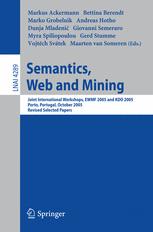

Most ebook files are in PDF format, so you can easily read them using various software such as Foxit Reader or directly on the Google Chrome browser.
Some ebook files are released by publishers in other formats such as .awz, .mobi, .epub, .fb2, etc. You may need to install specific software to read these formats on mobile/PC, such as Calibre.
Please read the tutorial at this link: https://ebookbell.com/faq
We offer FREE conversion to the popular formats you request; however, this may take some time. Therefore, right after payment, please email us, and we will try to provide the service as quickly as possible.
For some exceptional file formats or broken links (if any), please refrain from opening any disputes. Instead, email us first, and we will try to assist within a maximum of 6 hours.
EbookBell Team

0.0
0 reviewsFinding knowledge – or meaning – in data is the goal of every knowledge d- covery e?ort. Subsequent goals and questions regarding this knowledge di?er amongknowledgediscovery(KD) projectsandapproaches. Onecentralquestion is whether and to what extent the meaning extracted from the data is expressed in a formal way that allows not only humans but also machines to understand and re-use it, i. e. , whether the semantics are formal semantics. Conversely, the input to KD processes di?ers between KD projects and approaches. One central questioniswhetherthebackgroundknowledge,businessunderstanding,etc. that the analyst employs to improve the results of KD is a set of natural-language statements, a theory in a formal language, or somewhere in between. Also, the data that are being mined can be more or less structured and/or accompanied by formal semantics. These questions must be asked in every KD e?ort. Nowhere may they be more pertinent, however, than in KD from Web data (“Web mining”). This is due especially to the vast amounts and heterogeneity of data and ba- ground knowledge available for Web mining (content, link structure, and - age), and to the re-use of background knowledge and KD results over the Web as a global knowledge repository and activity space. In addition, the (Sem- tic) Web can serve as a publishing space for the results of knowledge discovery from other resources, especially if the whole process is underpinned by common ontologies.